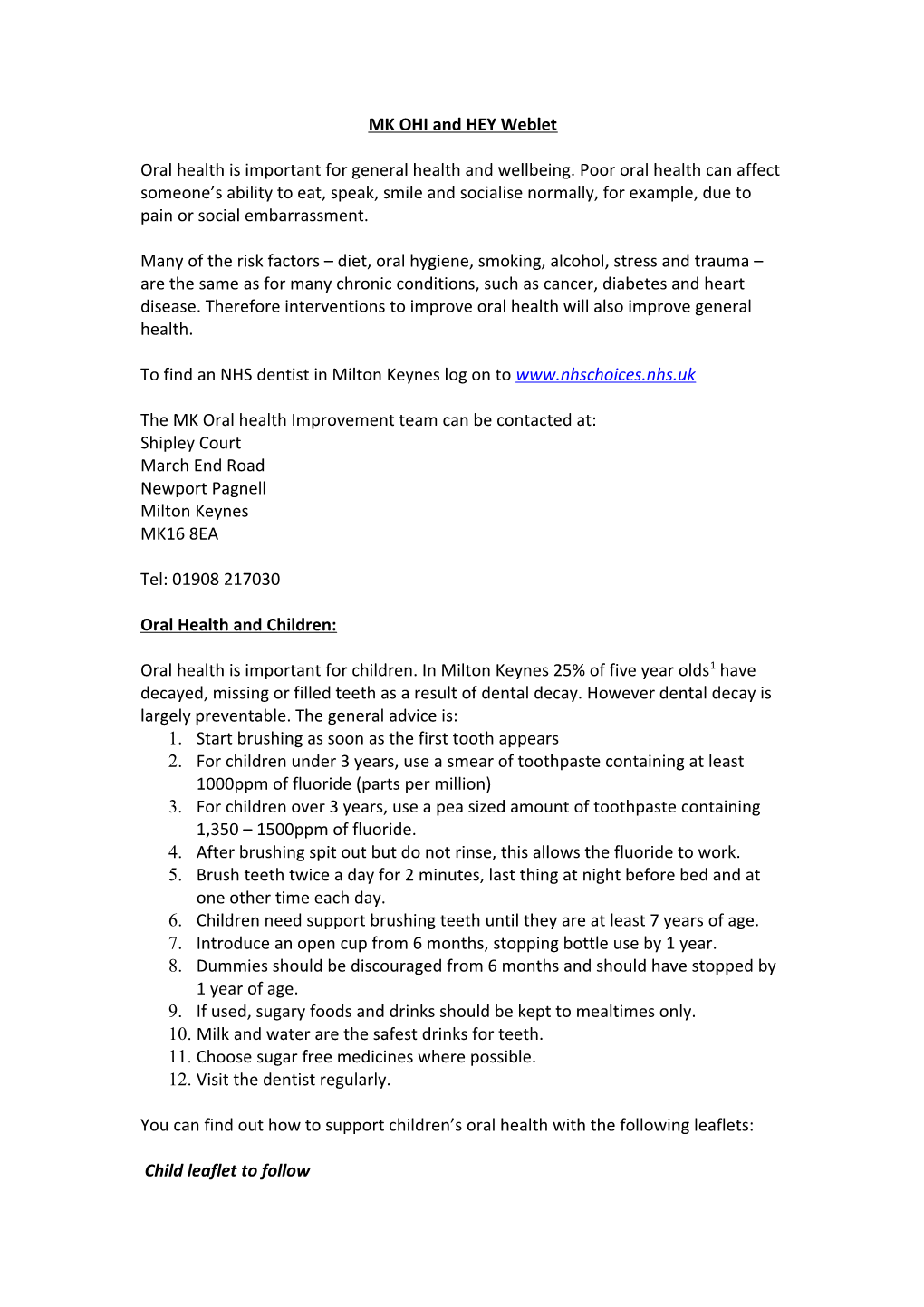MK OHI and HEY Weblet
Oral health is important for general health and wellbeing. Poor oral health can affect someone’s ability to eat, speak, smile and socialise normally, for example, due to pain or social embarrassment.
Many of the risk factors – diet, oral hygiene, smoking, alcohol, stress and trauma – are the same as for many chronic conditions, such as cancer, diabetes and heart disease. Therefore interventions to improve oral health will also improve general health.
To find an NHS dentist in Milton Keynes log on to
The MK Oral health Improvement team can be contacted at:
Shipley Court
March End Road
Newport Pagnell
Milton Keynes
MK16 8EA
Tel: 01908 217030
Oral Health and Children:
Oral health is important for children. In Milton Keynes 25% of five year olds1 have decayed, missing or filled teeth as a result of dental decay. However dental decay is largely preventable. The general advice is:
- Start brushing as soon as the first tooth appears
- For children under 3 years, use a smear of toothpaste containing at least 1000ppm of fluoride (parts per million)
- For children over 3 years, use a pea sized amount of toothpaste containing 1,350 – 1500ppm of fluoride.
- After brushing spit out but do not rinse, this allows the fluoride to work.
- Brush teeth twice a day for 2 minutes, last thing at night before bed and at one other time each day.
- Children need support brushing teeth until they are at least 7 years of age.
- Introduce an open cup from 6 months, stopping bottle use by 1 year.
- Dummies should be discouraged from 6 months and should have stopped by 1 year of age.
- If used, sugary foods and drinks should be kept to mealtimes only.
- Milk and water are the safest drinks for teeth.
- Choose sugar free medicines where possible.
- Visit the dentist regularly.
You can find out how to support children’s oral health with the following leaflets:
Child leaflet to follow
1 Davies G, Neville J, Rooney E, Robinson M, Jones A, Perkins C (2013) National Dental Epidemiology Programme for England: oral health survey of five-year-old children 2012 A report on the prevalence and severity of dental decay. Available at: and
Smile Award:
The Milton Keynes Oral Health Improvement team can support early years and child care settings to develop an oral health promoting environment and offer a FREE training and accreditation scheme, please contact the team for further information and support:
Smile Award flyer to be added
Resource boxes:
The Oral Health Improvement team has a range of resource boxes to support staff delivering sessions in early years and school setting. Please contact the team if you would like to borrow a resource box.
Healthy Early Years Award:
Who is it for?
The Milton Keynes Healthy Early Years Award is for all Early Years settings who provide a service for children aged 0-5 years.
What’s the aim?
The Healthy Early Years Award aims to provide consistent and coherent health promoting environments for services used by children aged 0-5 and their families, with the aim to support the development of healthier, happier babies and young children.
What does it do for me?
The Award and your supporting evidence will provide Ofsted with a powerful portfolio showing how you are improving children’s well being. The Award also demonstrates your commitment towards the Healthy Child Programme and intern the Every Child Matters agenda.
What's involved?
You need to show you meet 5 standards under each of the following health and wellbeing themes:
Healthy Eating (tooth friendly foods, healthy eating activities)
Physical Activity (play and active travel)
Lifestyle (emotional health, smoking, hygiene, safeguarding)
For further information please contact the Oral Health Improvement team.
Adults:
Oral health for adults is just as important, poor oral health has been linked with a number of health conditions including Diabetes, Stroke, Heart disease, Lung disease and Dementia. For adults the general advice to support positive oral health is:
- Brush twice a day with fluoride toothpaste
- Brush last thing at night and on one other occasion
- After brushing spit out the toothpaste but don’t rinse with water
- Your toothpaste should contain 1350-1500ppm fluoride
- Avoid sweet and sugary food and drinks between meals (this includes dried fruit, honey and pure fruit juice)
- See a dentist regularly – don’t wait until problems start
- Clean between your teeth with floss or interdental brushes (toothbrushes can’t reach between teeth)
- Avoid smoking
- Avoid chewing tobacco, paan, gutka or khat (these can cause oral cancer)
- Try to eat a balanced diet with at least 5 portions of fruit and vegetables a day
For vulnerable adults the impact of poor oral health can be greater. People with learning disabilities are more likely to have poor oral healthincluding: tooth-decay, gum disease, acid erosion and tooth wear. Vulnerable adults can have higher levels of untreated disease and have a larger number ofextractions withtreatment being difficult and often has to be carried out undersedation or general anaesthetic. Both pain and infection impair cognitivefunction which may already be reduced in adults with a learning disability.
Smile for Life:
The oral health improvement team can support residential settings to develop an oral health promoting environment and offer a FREE training and accreditation scheme, please contact the team for further information and support:
Smile for Life Flyer to be added
